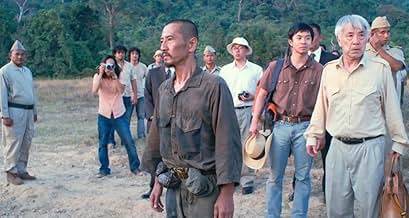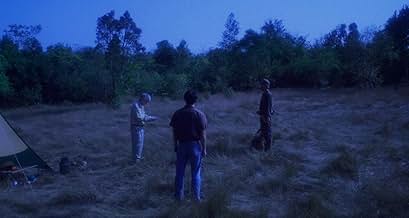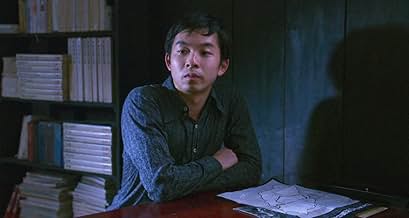NOTE IMDb
7,2/10
3,2 k
MA NOTE
Lorsque le Japon se rend à la fin de la Seconde Guerre mondiale, le soldat Hiroo Onoda se retire dans la jungle des Philippines pour continuer seul la guerre pendant 10 000 jours supplémenta... Tout lireLorsque le Japon se rend à la fin de la Seconde Guerre mondiale, le soldat Hiroo Onoda se retire dans la jungle des Philippines pour continuer seul la guerre pendant 10 000 jours supplémentaires.Lorsque le Japon se rend à la fin de la Seconde Guerre mondiale, le soldat Hiroo Onoda se retire dans la jungle des Philippines pour continuer seul la guerre pendant 10 000 jours supplémentaires.
- Réalisation
- Scénario
- Casting principal
- Récompenses
- 5 victoires et 20 nominations au total
Yûya Endô
- Hiroo Onoda - Young
- (as Endô Yûya)
Kanji Tsuda
- Hiroo Onoda - Old
- (as Tsuda Kanji)
Yûya Matsuura
- Kinshichi Kozuka - Young
- (as Matsuura Yûya)
Tetsuya Chiba
- Kinshichi Kozuka - Old
- (as Chiba Tetsuya)
Shinsuke Kato
- Shôichi Shimada
- (as Katô Shinsuke)
Kai Inowaki
- Yûichi Akatsu
- (as Inowaki Kai)
Issei Ogata
- Major Yoshimi Taniguchi
- (as Issey Ogata)
Taiga Nakano
- Norio Suzuki - The Tourist
- (as Nakano Taïga)
Nobuhiro Suwa
- Tanejirô Onoda - Onoda's Father
- (as Suwa Nobuhiro)
Mutsuo Yoshioka
- Captain Hayakawa
- (as Yoshioka Mutsuo)
Tomomitsu Adachi
- Governor-General Shigenori Kuroda
- (as Adachi Tomomitsu)
Kyûsaku Shimada
- Lieutenant Suehiro
- (as Shimada Kyûsaku)
Jemuel Satumba
- Filipino Prisoner
- (as Jemuel Cedrick Satumba)
Ryû Morioka
- Student
- (as Ryu Morioka)
Akira Morita
- Extra
- (as Morita Akira)
Avis à la une
The case of Onoda, a WW2 Japanese soldier who carried on fighting for thirty years on the Philippine island of Lubang before being persuaded to give up, was a celebrated case in the mid 1970s, and I was really impressed by this dramatic reconstruction of his life. It's a high quality movie, beautifully filmed, thoughtful, and well played all round, though I also thought it a bit too long at more than 2.5 hours. There are great performances all round and solid direction which almost has a David Lean approach at times (no bad thing), so it's a 'small scale epic' with a heart, and well worth a view. There are some supremely effective moments, and the film deserves a wider audience, though you do have spare quite a bit of time.
Although a little bit long, this is about offering us to share a rather unique and captivating life experience, that of brainwashed Japanese soldiers who only stopped the war 30 years after the capitulation. I appreciated the warm and moist beauty of the jungle and the tropical forest, the change of scenery provided, the sober image which seems authentic and of the period, the "film" aspect and documentary grain. Documentary also as long as there is no lady state. Innocent people go there. The story that is told to us is quite simply captivating and I would not have believed that this anecdote from History, which could be summed up in a few lines, could fit into such a great film. With hindsight, however, I can understand that it does not please some who would fall into boredom; with this film it's a bit all or nothing, you have to succeed in immersing yourself. It is a French film, and as such it must be emphasized that it is a nugget.
What a good surprise this film directed by a French and speaking of the war in the Pacific from the Japanese point of view. So unexpected and awesome in the same time. I could not believe that this young director is not under the influence of Clint Eastwood's LETTERS FROM IWO JIMA, John Boorman's HELL IN THE PACIFIC or Kon Ichikawa's FIRES IN THE PLAINS. Impossible for me to think that he would have never heard of those three iconic films. Back to this one, I don't know how anyone could say harm about it, except maybe a bit too long; yes, maybe. Plus, it speaks not only of the japanese soldiers, but not the kamikaze or simple fighters, but some kind of secret section of soldiers sent into a Philippines Island. The young director from France is also aware of the Mizoguchi's influence and with the poetic lines of the Japanese spirit. Good film to be watched at any cost. Only for this incredible but so authentic story.
In the closing phase of the Second World War, Imperial Japan inserts numerous specially trained soldiers throughout the Pacific islands whose secret mission is to survive at all costs and wage an unending campaign of guerrilla warfare. This film depicts the three-decade campaign of postwar "resistance" waged on Lubang Island, Philippines by Hiroo Onoda, the very last of the infamous Japanese "holdouts" who refused to accept the war had ended, against all reason and repeated attempts to make contact.
As a film, it's great - it's dramatic and engaging, with great writing, direction, and acting. But the deeper social reality is quite disturbing. Onoda and others like him are revered by many in Japan as exemplars of grit, determination, and steadfast dedication to duty, rather than as exemplars of the kind of rigid fanaticism and pathological obedience that made a continent's worth of war crimes possible.
As a film, it's great - it's dramatic and engaging, with great writing, direction, and acting. But the deeper social reality is quite disturbing. Onoda and others like him are revered by many in Japan as exemplars of grit, determination, and steadfast dedication to duty, rather than as exemplars of the kind of rigid fanaticism and pathological obedience that made a continent's worth of war crimes possible.
Felt it is a bit too long in several scenes particularly early on, but watched it very smoothly due to the great story line.
Actors are all very impressive. Performance by Taiga Nakano was a relief in otherwise very serious picture.
Director Arthur Harari should deserve an admiration creating all Japanese language picture despite limited business prospect.
Ken Kai.
Actors are all very impressive. Performance by Taiga Nakano was a relief in otherwise very serious picture.
Director Arthur Harari should deserve an admiration creating all Japanese language picture despite limited business prospect.
Ken Kai.
Le saviez-vous
- AnecdotesWhilst set on a remote Philippines Island the film was in fact shot on location in the kingdom country of Cambodia.
Meilleurs choix
Connectez-vous pour évaluer et suivre la liste de favoris afin de recevoir des recommandations personnalisées
- How long is Onoda: 10,000 Nights in the Jungle?Alimenté par Alexa
Détails
- Date de sortie
- Pays d’origine
- Sites officiels
- Langues
- Aussi connu sous le nom de
- Onoda: 10,000 Nights in the Jungle
- Lieux de tournage
- Bokor National Forest, Cambodge(jungle)
- Sociétés de production
- Voir plus de crédits d'entreprise sur IMDbPro
Box-office
- Budget
- 4 530 000 € (estimé)
- Montant brut mondial
- 262 276 $US
- Durée2 heures 53 minutes
- Couleur
- Rapport de forme
- 1.85 : 1
Contribuer à cette page
Suggérer une modification ou ajouter du contenu manquant

Lacune principale
What is the Canadian French language plot outline for Onoda, 10 000 nuits dans la jungle (2021)?
Répondre































